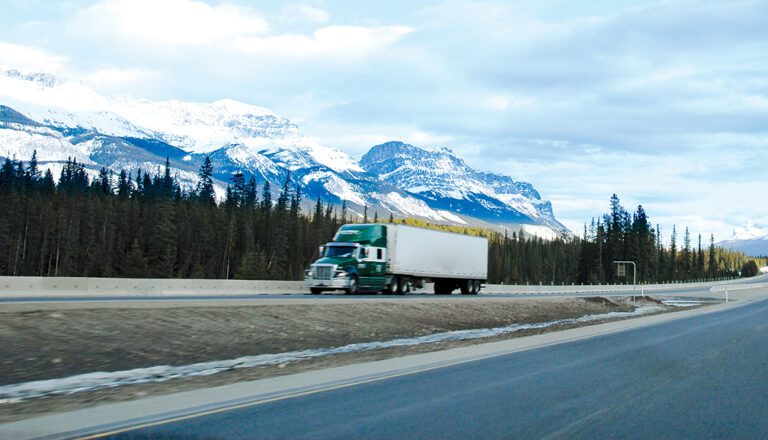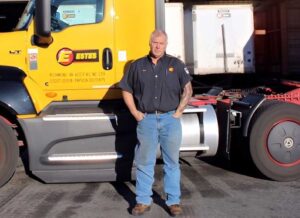Members of the Canadian trucking industry are applauding the enforcement of electronic logging device (ELD) guidelines, effective January 1, 2023, calling it a major step toward reducing fraud and leveling the playing field across the industry.
“(It’s) absolutely positive. The No. 1 thing about it would be safety and more transparency to what those days look like in an audit situation,” said Doug Sutherland, president of British Columbia-based Sutherland Group.
“Then, when you look at the competitive atmosphere — when someone quotes a run and says they can do that overnight when they legally can’t do that — it really changes the rates in the industry,” he added. “We want fair, competitive rates, but if someone’s cheating and they’re running over the legal hours and then they’re cheating on a logbook, electronic logs help eliminate that.”
The Canadian government passed new regulations concerning ELDs last summer, but provinces reported they were not prepared to begin enforcement. By waiting until 2023 to enforce ELD regulations, provinces were given time to formulate their regulations. Meanwhile, the country’s roadside inspectors embarked on a period of education and awareness.
“Technically, the new rules went into effect in June of 2022, but they weren’t enforced,” said Geoff Wood, senior vice president of policy for the Canadian Trucking Alliance. “At that point there was no enforcement happening, depending on the jurisdiction. Some of them may have issued a warning but there were no monetary fines or penalties issued prior to January 1.”
January 1 wasn’t an entirely clean break with the previous regulations, however, as some provinces reached the new year without finalizing plans for enforcement, penalties, and other province-specific elements allowed under the law. However, as TruckNews.com reported the first week of January, only the province of Quebec remains in limbo, with final action there delayed until June 1.
That development, along with various differences in provincial guidelines, is an irritant to those eager to operate nationwide under consistent rules. For instance, British Columbia’s provincial regulations state that vehicles operating solely within the province are not required to have ELDs until provincial regulations are changed to mandate them (this according to the British Columbia Ministry of Transportation and infrastructure as reported by TruckNews.com).
The Truckload Carriers Association (TCA), while praising the developments in general, stated its desire to see consistent, nationwide regulations sooner rather than later.
“TCA supports consistent enforcement of the ELD mandate in Canada as an important tool to ensure compliance with the hours-of-service regulations,” said Caitlin Smith, TCA’s manager of government affairs. “It’s important that enforcement time lines are properly managed and communicated to the relevant stakeholders.”
Sutherland says that enforcement initiatives are in progress.
“It’ll get there,” he said. “It’s a little frustrating because we’ve waited years for this to come into play and it’s been delayed. But we also understand it’s government and it takes time to pass things. Some provinces are slower than others. Some provinces have different things that they’re dealing with at the time that may be a higher priority.”
The new federal rules, now being enforced, require trucking companies to switch from paper logs to ELDs. They also require devices in use to be government-approved third-party-certified models rather than self-certified equipment.
“This is something that our members have been asking for for more than a decade, and we’re really happy that we’re taking those last few steps to get where ELDs are running and enforced consistently,” said Dave Earle, president and CEO of the British Columbia Trucking Association. “While nothing is perfect, these are going to make it a lot easier for those who comply and make it a lot more difficult for those that cheat to continue to cheat.
“When we talk about ELDs, it doesn’t change the law in terms of hours of service. It’s just the methodology that has to be used to comply,” he continued. “What we look at, and what our members look at, is before this came into play about 60% of our membership were already running (ELDs), were already running right and trying to do the right things.”
In one respect, the law brings Canada closer in step with the U.S. where the Federal Motor Carrier Safety Administration (FMCSA) first published ELD rules in 2015 and full compliance was required in 2019.
However, cross-border shippers based in the U.S. are advised that the ELDs that meet U.S. regulations may fall short under Canadian law. That’s because of differences in the manner ELDs are certified to meet the respective government standards.
“In the U.S. it’s self-certified; the vendors self-certify to meet the ELD standard,” Wood said. “In the Canadian context, it’s third-party certified; the vendors don’t certify themselves. There’s a very rigorous process the devices go through by which the devices themselves are checked in every step against a technical standard. If they pass, they pass; and if they don’t, they don’t get certified. And if they’re not on the certified list, you can’t use it.”
Earle says that, for this reason, U.S. shippers may find themselves having to retrofit existing ELD equipment to be compliant with Canadian law.
“All the Canadian stuff with be compliant south of the line; it will meet the FMCSA standards. That’s not an issue for Canadian carriers going south,” he said. “But U.S. carriers coming north — there’s going to be some crossover of models, but it would be really, really smart for U.S. carriers to double check that. It would be a good idea to start looking at their ELD equipment before one of their drivers gets pinched on the 401 outside Toronto and they say, ‘Hey, you’re not compliant.’”
These hiccups aside, proponents of the new rules say there’s no excuse for a shipper of any size or nationality to not meet the Canadian standard.
“If you want me to sort of rip the Band-Aid off, the only trucking companies, their drivers, or those in the supply chain that are concerned about this are the people that are trying to cheat. Full stop,” Wood said. “That’s what it boils down to. Everybody sort of likes to dance around that and they don’t like to say it, but we’re on record. If people have an issue with this, there’s only one reason why.”
This article originally appeared in the March/April 2023 edition of Truckload Authority, the official publication of the Truckload Carriers Association.
Dwain Hebda is a freelance journalist, author, editor and storyteller in Little Rock, Arkansas. In addition to The Trucker, his work appears in more than 35 publications across multiple states each year. Hebda’s writing has been awarded by the Society of Professional Journalists and a Finalist in Best Of Arkansas rankings by AY Magazine. He is president of Ya!Mule Wordsmiths, which provides editorial services to publications and companies.














